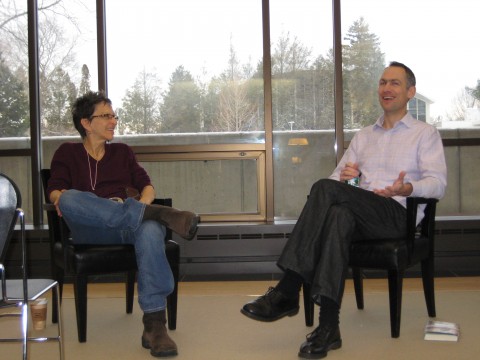
How does a stay-at-home St. Louis dad raised in England write a prize-winning young adult novel about a deaf teenage girl in the Seattle suburbs? That’s exactly what Professors Simon Hay and Blanche Boyd asked author Antony John during his visit to campus.
The charismatic author visited Conn February 21 to read the first chapter of his latest novel, Five Flavors of Dumb, and have an open discussion about young adult fiction writing with Boyd, the English Department’s writer-in-residence.
Hay shared an apartment with John for three years in graduate school at Duke University. John was working toward a Ph.D. in Music Composition to follow his bachelor’s degree in Music from Oxford University. John fondly recalled that when Hay and other English students discussed literature during their time at Duke, he would think, “That is so cool! I don’t think I get it, but it’s so cool!”
Music does seem like a strange place from which to launch a career as a novelist. “I’m flying by the seat of my pants here,” John said, laughing. He pointed out that even though he holds no formal education in English or writing, compositions in both mediums have “theme and structure,” and one has to ask oneself similar questions before embarking on a work: Where am I going with this? Where will it be performed, and for whom?
Music also plays an important role in John’s fiction. “It keeps appearing in my novels, I don’t know why that is,” he joked. In his first book, Busted: Confessions of an Accidental Player, the protagonist is a musician, and his new Five Flavors of Dumb follows a squabbling teenage rock band managed by the unlikely Piper Vaughn.
John’s editor told him that there was already a multitude of rock music themed young adult novels, so John’s wife suggested that he explore the topic from the point of view of a deaf person. John was fascinated by the idea of musical culture intersecting with deaf culture, and in the discussion cited deaf rapper Sean Forbes, and deaf percussionist Evelyn Glennie, both of whom experience their music in entirely unique ways.
John underwent three solid months of research for his novel, assembling a deaf team to learn about growing up with the condition, speaking with physicians, and attending an ASL class. He also became aware of the ideological conflict between cochlear implants, which can restore hearing in some profoundly deaf individuals, and the traditional view of celebrating deafness and sign language instead of branding it as a handicap. This conflict is a central theme of Five Flavors.
Boyd was impressed with John’s research, mentioning that going out and gathering information is not her forte. The differences between the two writers became apparent as they talked. When John remarked that he had all of his most recent work completely planned out before hitting the keyboard, Boyd replied, “I can’t do that. People ask me what my book is about, and I say, ‘I don’t know.’”
John and Boyd also discussed the dissimilarities in fiction when age audience differs; Hay asked if “not having to write according to narrative structure can be debilitating.” Boyd agreed that adult fiction can be tricky because, unlike with young adult, there needn’t necessarily be an ending. She said that one of her first novels was like “walking off a cliff at the end.”
John added that conventions, such as the young adult model for a clear, coming-of-age plot with a moral to close, “do not mean you are confined.” When Boyd asked him if he was restricted in content because of his genre, he said, “Really, anything goes.” Young adult fiction does not necessarily mean more innocent subject matter. He referenced Barry Lyga’s acclaimed Boy Toy, in which a teenager is trying to get over the affair he had with his teacher when he was twelve.
“I just like to see kids reading,” John said, even if they pick up the thinly disguised young adult versions of harlequin novels. He himself was a self-professed reluctant reader in high school, until he came upon S.E. Hinton and the likes of The Outsiders. For a sixteen-year-old in a British all-boys’ school, reading about gangs in Oklahoma could not have been more alien to him, but he was hooked. Boyd similarly described discovering literature as this “covert message [and a] key to truth,” which was “electrifying.”
John’s appreciation for literature took a back seat until he started staying home with his two boys, which, though he loved, he knew needed to be supplemented with something intellectually stimulating. In a few frightfully simple-sounding steps, he wrote a novel, got an agent, and received a multiple-book deal from a publisher.
“I think the stories of how people come to be writers are amazing,” said Celia Whitehead ’11, who attended the talk.
“I love it,” said John about his work. “I just get to sit in coffee shops and make stuff up all day. I know I’m not supposed to say that, I’m supposed to be suffering for my art, but really, what could be better?” •










[…] challenges and the particular satisfaction it brings. The college newspaper even did a wonderful write-up of the event (with […]